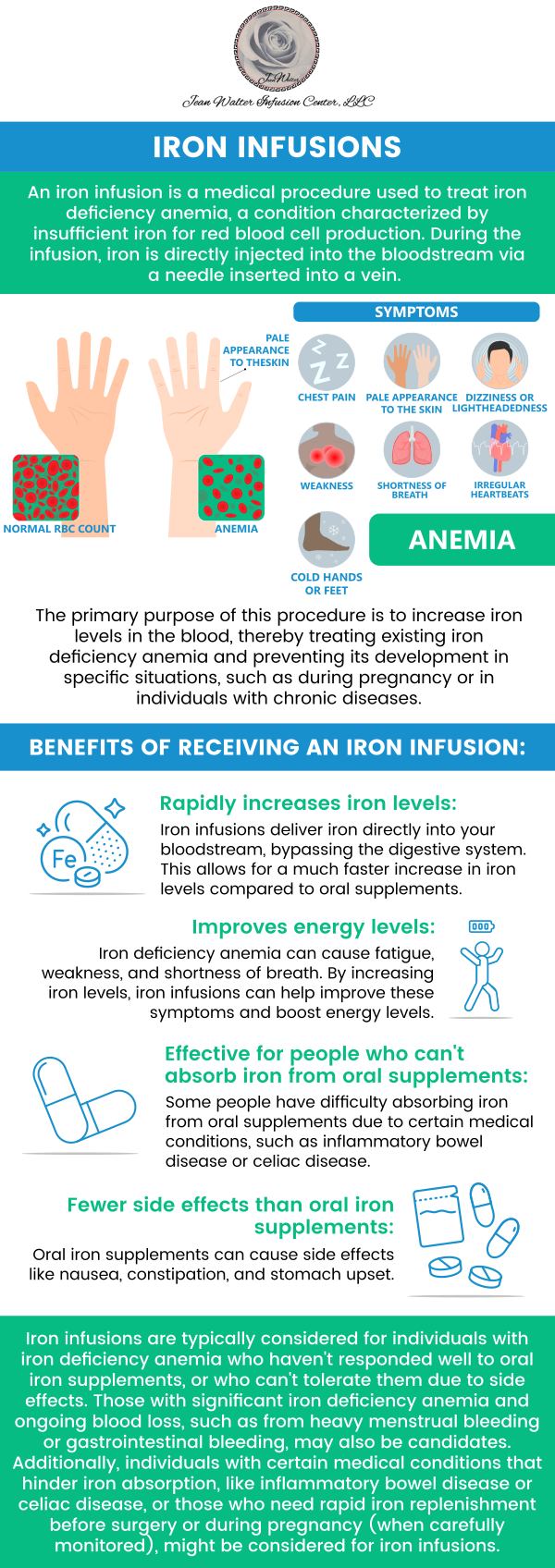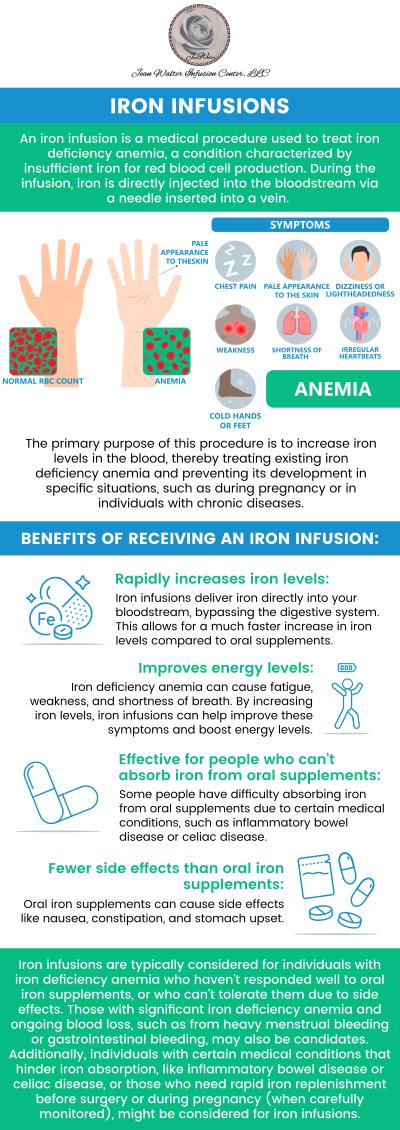Intravenous Iron vs. Oral Iron in Iron Deficiency Anemia Q&A
The easy administration and inexpensive cost of oral iron have advantages, but it is constrained by adverse effects, poor compliance, poor absorption, and low effectiveness. The greatest way to ensure that the bone marrow receives readily accessible iron is through intravenous iron. If you’re considering IV iron to treat your anemia, connect with us at Jean Walter Infusion Center or book online to schedule an appointment with one of our specialists. Dr. Nasser Nasseri, MD, and his team would be happy to consult with you about which infusion option is best for your unique health goals. We have convenient locations to serve you in Edgewater, Rosedale, Columbia, Glen Burnie, North Baltimore, and Catonsville MD.




Table of Contents:
Is it better to have an iron infusion or oral iron?
Do iron infusions work better than pills?
Does IV iron correct anemia faster?
What indicates the need for an iron infusion?
Iron is an essential mineral that plays a crucial role in producing red blood cells, carrying oxygen throughout the body, and maintaining overall health. However, millions of people worldwide suffer from iron deficiency anemia, which occurs when the body lacks sufficient iron to produce hemoglobin, resulting in unpleasant symptoms such as fatigue, weakness, shortness of breath, headaches, and much more.
Iron supplements are commonly taken orally in tablet or liquid form, are available over the counter, and are a convenient option for those with mild cases of iron deficiency anemia.
However, oral iron supplements take longer to work than iron infusions, ranging from several weeks to months. Moreover, oral iron supplements can cause stomach irritation, such as nausea, vomiting, abdominal pain, and constipation, and some people may not absorb oral iron supplements effectively.
In contrast, iron infusions deliver iron directly into a patient’s bloodstream via an intravenous (IV) line, providing a more rapid effect than oral iron supplements. Iron infusions bypass the digestive system, minimizing the possibility of gastrointestinal side effects, and may offer immediate relief from the symptoms of iron deficiency anemia.
Iron infusions are typically recommended for those who can’t tolerate oral iron supplements or require rapid iron replenishment, as they deliver a significant amount of iron in one sitting.
Overall, deciding whether to use oral iron or iron infusions should be based on discussions between you and your healthcare provider, the severity of your condition, and your unique health and circumstances, as each treatment has its own set of advantages and disadvantages.
While both types of iron supplementation can be effective, iron infusions are more efficient at raising hemoglobin levels. By bypassing the digestive system, infusions can provide a relatively rapid elevation of the iron level compared to oral pills.
Infusions also contain a higher concentration of iron compared to oral supplements, making them effective for people who can’t absorb iron from tablets.
One significant advantage of iron infusions is that people with severe iron deficiency and anemia can replenish their iron levels quickly. For such people, iron pills may take longer to work, and they may need to receive iron infusions to address the deficiency rapidly.
Infusions can also offer better iron replacement therapy for pregnant women where fast resolution of anemia is needed.
Studies have shown that IV iron is generally more effective in correcting anemia than oral iron supplements.
IV iron can quickly replenish iron stores and increase hemoglobin levels, often within days or weeks.
On the other hand, oral iron supplements may take longer to correct anemia as they need to be absorbed through the digestive system before they can be utilized by the body.
The following are some indicators that suggest the need for an iron infusion:
• Heavy menstrual bleeding. Women with heavy menstrual bleeding are at a higher risk of developing iron deficiency and may require iron infusions to replenish their iron stores.
• Inability to exercise. People with iron deficiency may notice that they have less stamina to perform routine physical activity and may find themselves getting short of breath while exercising. They may also find that they are not recovering from low-intensity exercise as quickly as they used to.
• Inadequate absorption of iron Some people may have medical conditions that inhibit the absorption of iron from their diets, and in such cases, an iron infusion may be recommended.
• Pale skin and nails. A person with low levels of iron will likely have pale skin, lips, and nails, and may also develop brittle nails that break easily or become spoon-shaped.
• Persistent fatigue. If an individual experiences continuous fatigue despite sleeping well, it could be due to an iron deficiency, which can be diagnosed through a blood test.
At Jean Walter Infusion, our team of infusion specialists will provide the high-level care that you need to address your low iron levels or anemia. Contact us today for any questions that you may have, or book with us online to schedule an infusion appointment at your earliest convenience. We serve patients from Catonsville MD, Rosedale MD, Columbia MD, Glen Burnie MD, Edgewater MD, North Baltimore MD, Parkville MD, Middle River MD, Dundalk MD, Halethrope MD, Ellicott City MD, Laurel MD, Hebbville MD, and Woodlawn MD.
Check Out Our 5 Star Reviews

Additional Services We Offer


- Infusion Therapy
- Injection Treatments
- Intravenous Immunoglobulin Therapy
- Medical Conditions
- Asthma
- Crohn’s Disease
- Fibromyalgia
- Gout
- Inflammatory Eye Disease
- Inflammatory Skin Disease
- Iron Deficiency
- Lupus
- Multiple Sclerosis
- Myositis
- Osteoporosis
- Rheumatoid Arthritis
- Ulcerative Colitis
- Vasculitis
- PRP Injections






